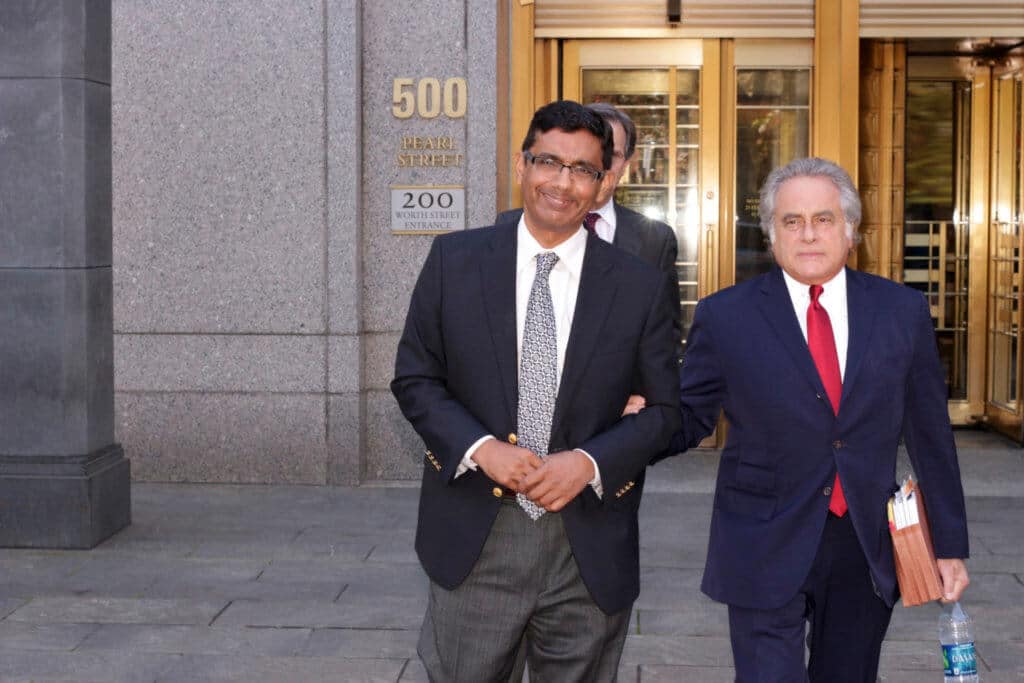Dinesh D’Souza, the best-selling author and documentarian who received a presidential pardon for a felony conviction of making illegal campaign contributions, has spent almost four decades in a cycle of provocation and controversy that has made him, at times, a hero of the right.
His books and movies attacking liberal ideologies and politicians have had great commercial success, but he has promoted conspiracy theories and his work has been criticized as inaccurate and excessively incendiary, sometimes by other conservatives.
President Donald Trump pardoned him Thursday, saying D’Souza had been “treated very unfairly by our government,” echoing a claim the commentator has often made himself.
Here’s a look at D’Souza’s past.
He pleaded guilty in 2014 to a campaign finance violation.
In 2014, D’Souza was accused of using straw donors to donate $20,000 to a Republican Senate candidate in New York, exceeding the personal limit of $5,000. He pleaded guilty and was sentenced to a $30,000 fine and five years of probation, including eight months living under supervision in a “community confinement center” in San Diego.
Prosecutors said he enlisted two people to donate $10,000 apiece on behalf of themselves and their spouses to Wendy E. Long, a friend from Dartmouth who lost in a landslide to Sen. Kirsten E. Gillibrand, D-N.Y. He then reimbursed the donors in cash.
His lawyer, Benjamin Brafman, defended the illegal donations as “an act of misguided friendship.”
Preet Bharara, then the U.S. attorney for the Southern District of New York, pushed for prison time, but the judge, Richard M. Berman of U.S. District Court in Manhattan, decided to spare him. “I deeply regret my conduct,” D’Souza told him.
D’Souza and his lawyer have said he was politically targeted because of his opposition to President Barack Obama, a claim Berman called “nonsense.”
After the pardon announcement Thursday, D’Souza made a direct link between the move and Bharara’s fierce criticism of Trump.
His ascent to political prominence began in college.
Born and raised in India, D’Souza attended Dartmouth College and was among the first editors of The Dartmouth Review, a conservative campus newspaper. The publication stirred uproars on campus during and after his stint as editor.
After graduating in 1983, he worked at Policy Review, a conservative journal in Washington. He worked for the Reagan administration as an adviser in 1988.
He has written more than a dozen books. His first, “Illiberal Education,” was published in 1991, lifting him to national notoriety with his criticism of political correctness on college campuses.
He attracted criticism from liberals and conservatives alike in 2007 for “The Enemy at Home: The Cultural Left and Its Responsibility for 9/11.” Michiko Kakutani of The New York Times wrote that “this embarrassing volume is an out-and-out partisan screed made up of illogical arguments, distorted and cherry-picked information, ridiculous generalizations and nutty asides.”
D’Souza has been a fierce Obama critic.
D’Souza, a frequent guest on Fox News and conservative radio, has often singled out President Barack Obama for criticism. His 2010 book, “The Roots of Obama’s Rage,” argued that Obama was carrying out the anti-colonial agenda of his Kenyan father.
A 2010 Forbes cover article by D’Souza that discredited Obama’s American identity was praised by Newt Gingrich as “stunningly insightful,” and criticized by an editor at The Columbia Journalism Review as “the worst kind of smear journalism.”
D’Souza’s 2012 film, “2016: Obama’s America,” was one of the highest-grossing political documentaries of all time, behind only Michael Moore’s “Fahrenheit 9/11.” Four years later, he came back with another documentary, “Hillary’s America.”
He has been the subject of personal and political controversies.
In 2012, D’Souza resigned as president of the Christian-affiliated King’s College after he was spotted entering a hotel with a woman who was not his wife, from whom he had been separated.
D’Souza has frequently been criticized for making incendiary or conspiracy-promoting remarks, including his suggestion in August that a violent white nationalist rally in Charlottesville, Virginia, had been staged, and his incorrect claim in October that Hitler was not anti-gay.
The commentator’s appearances at colleges have also stoked controversy. Speaking at Stony Brook University in April, he joked about the Holocaust.
“When I turn on the TV and I see Charlottesville, I literally see this scene: There’s one white supremacist and the guy himself doesn’t even look like he knows where he is,” he said, according to The Statesman, a campus newspaper. “He’s a virtual imbecile, he may call himself a neo-Nazi, but the truth is Himmler would’ve sent him straight to the gas chambers.”
In February, D’Souza was disinvited from a speaking appearance at the Conservative Political Action Conference after mocking the Parkland, Florida, shooting survivors on Twitter.
“Worst news since their parents told them to get summer jobs,” he wrote after Florida lawmakers voted against an assault weapons ban.
James Panero, who graduated from Dartmouth in 1998 and is now executive editor of The New Criterion, a conservative literary journal, said in 2014 that D’Souza “was the all-star, the guy every student aspired to be.”
But, Panero added, “I think the rewards of playing to the crowd, of throwing out red meat, have become too great.”
© 2018 New York Times News Service
